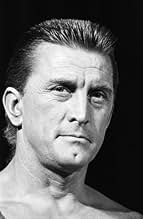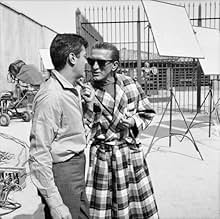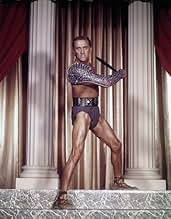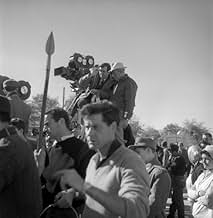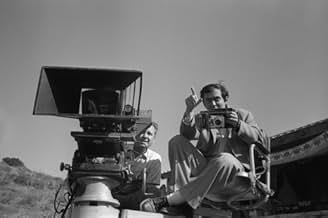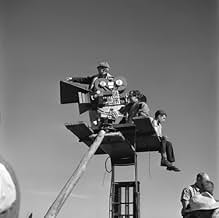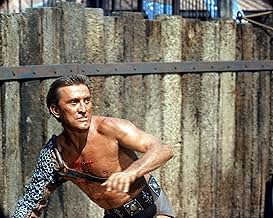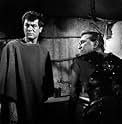Spartacus
- 1960
- Tous publics
- 3h 17min
L'esclave Spartacus mène la révolte violente contre la République Romaine décadente.L'esclave Spartacus mène la révolte violente contre la République Romaine décadente.L'esclave Spartacus mène la révolte violente contre la République Romaine décadente.
- Réalisation
- Scénario
- Casting principal
- Récompensé par 4 Oscars
- 12 victoires et 11 nominations au total
Résumé
Reviewers say 'Spartacus' is lauded for its epic scale, historical drama, and standout performances by Kirk Douglas, Laurence Olivier, and Peter Ustinov. Key themes include the fight for freedom, class conflict, and human resilience. However, some criticize historical inaccuracies, pacing, and the film's length. Love scenes and certain character arcs receive mixed feedback. Despite these issues, the film's spectacle, cinematography, and ensemble cast performances are widely appreciated.
Avis à la une
10bb_org
A very moving and compelling story of epic proportions. The plot is relentless, propelled by a dazzling screenplay. Kubrick draws some of the greatest performances of the cast, and fills the screen with images that fascinate throughout. Well paced for a movie of this magnitude.
To those who complain of anachronisms and poetic license with historical events, I say to them, 'Remember, it is a movie.' To be truly accurate, the cast would be delivering their lines in Latin and ancient Greek, with English subtitles. Whatever Kubrick might lose with historical inaccuracies, he gains far more in his ability to convey the story to the viewer. Even though it is over forty years old, the film tells us more of the present day than it does of the past.
To those who complain of anachronisms and poetic license with historical events, I say to them, 'Remember, it is a movie.' To be truly accurate, the cast would be delivering their lines in Latin and ancient Greek, with English subtitles. Whatever Kubrick might lose with historical inaccuracies, he gains far more in his ability to convey the story to the viewer. Even though it is over forty years old, the film tells us more of the present day than it does of the past.
Another Kubrick's masterpiece and very influential movie in it's genre.
Kirk Douglas did great job as Spartacus but for me the best charachter in this movie was Laurence Olivier as Crassus. He brings on of the best villain performances I've ever seen. Spartacus had a lot of influence on Ridley Scoot's Gladiator, from way of acting (especially the similarity between Joaquin Pheonix and Laurence Olivier's character) to the way camera moves and shots are taken. This is truely a great historical film and a classic you should see. It will be hard for me to rank it amongst other Kubrick's films but I will try it (don't get angry if you disagree).
From what little I've read of this film it was lucky to have been made at all. Some very big talents had some very big egos and those egos clashed repeatedly. Original director Anthony Mann was replaced by Stanley Kubrick by Producer/Star Kirk Douglas among other clashes.
But the result was all worth it. The stars all give top notch performances, but the mark of a really great film is the memorability of each individual in the ensemble. To give a few examples, Charles McGraw as the sadistic trainer at the gladiatorial school, John Dall as Sir Laurence Olivier's protégé, and John Ireland as Kirk Douglas's fellow gladiator trainee are all memorable in the brief roles they have.
Kirk Douglas wisely opts for a straightforward interpretation of a hero in the title role of Spartacus. He's a BC everyman, born into a world which hadn't heard anything about human rights, he knows and feels he's not just cattle. Catch the alternating scenes of Douglas and Sir Laurence Olivier addressing the slave army and the Roman Army. Olivier with his years of Shakespearean training coming across as the tyrant to be, and Douglas in simple prose talking about the slaves fighting for their hopes and dreams. Very effective.
The plot concerns a revolt at a gladiatorial school which mushrooms into a crisis for the Roman Empire. Political factions led by Olivier as Crassus and Charles Laughton as Gracchus seek to use the slave revolt to further their own ends.
Laughton as always is a wonder. It's a bit of unusual casting for him because his parts are usually those of very tortured souls. His Gracchus is a sly rogue, but a decent man. One of my favorite movie lines of all time is delivered by him addressing the Roman Senate where he says he'll "take a little republican corruption for a little republican freedom."
Another sly rogue in the film is Peter Ustinov who won the first of his two Oscars as Batiatus the owner of the gladiatorial school. Like so many others I'm sure in those days, he's just trying to come out on the winning side when doing so could be a life or death situation.
Jean Simmons as Varinia, beloved of Spartacus, has the only woman's part of any substance. But when was Ms. Simmons bad in anything. One of the most underrated and under-appreciated actresses in the history of film.
The lessons about man's desire for freedom and to control his own destiny are eternal and valid. And this film will be also.
But the result was all worth it. The stars all give top notch performances, but the mark of a really great film is the memorability of each individual in the ensemble. To give a few examples, Charles McGraw as the sadistic trainer at the gladiatorial school, John Dall as Sir Laurence Olivier's protégé, and John Ireland as Kirk Douglas's fellow gladiator trainee are all memorable in the brief roles they have.
Kirk Douglas wisely opts for a straightforward interpretation of a hero in the title role of Spartacus. He's a BC everyman, born into a world which hadn't heard anything about human rights, he knows and feels he's not just cattle. Catch the alternating scenes of Douglas and Sir Laurence Olivier addressing the slave army and the Roman Army. Olivier with his years of Shakespearean training coming across as the tyrant to be, and Douglas in simple prose talking about the slaves fighting for their hopes and dreams. Very effective.
The plot concerns a revolt at a gladiatorial school which mushrooms into a crisis for the Roman Empire. Political factions led by Olivier as Crassus and Charles Laughton as Gracchus seek to use the slave revolt to further their own ends.
Laughton as always is a wonder. It's a bit of unusual casting for him because his parts are usually those of very tortured souls. His Gracchus is a sly rogue, but a decent man. One of my favorite movie lines of all time is delivered by him addressing the Roman Senate where he says he'll "take a little republican corruption for a little republican freedom."
Another sly rogue in the film is Peter Ustinov who won the first of his two Oscars as Batiatus the owner of the gladiatorial school. Like so many others I'm sure in those days, he's just trying to come out on the winning side when doing so could be a life or death situation.
Jean Simmons as Varinia, beloved of Spartacus, has the only woman's part of any substance. But when was Ms. Simmons bad in anything. One of the most underrated and under-appreciated actresses in the history of film.
The lessons about man's desire for freedom and to control his own destiny are eternal and valid. And this film will be also.
I know my summary may sound opinionated...but I couldn't help being entertained by this film. If I had any complaints it would be there are one or two parts that suffer from uneven pacing and in the latter half especially there are a lot of wordy speeches from Kirk Douglas. That said, it is very well made, with sweeping cinematography, beautiful costumes and well constructed sets. The score is triumphant and bombastic, Kubrick's direction is secure and the script is surprisingly intelligent and knowing. Also the action is brilliantly done, and the performances are to be much applauded, with Kirk Douglas believable and sincere in the title role, Jean Simmons alluring as Varina and Laurence Olivier, Peter Ustinov and Charles Laughton stealing every single scene they are in.
Overall, maybe not Kubrick's very best, but a fine historical epic. 9/10 Bethany Cox
Overall, maybe not Kubrick's very best, but a fine historical epic. 9/10 Bethany Cox
It is very much part of Hollywood folklore that having dispensed with the services of Anthony Mann, producer and star Kirk Douglas brought in Stanley Kubrick with whom he had worked so effectively in 'Paths of Glory'. This represented a daunting challenge and Kubrick passed with flying colours. The rest as they say is history although Douglas always felt that Kubrick was not as grateful as he should have been!
It would be well-nigh impossible now to assemble a cast of such substance and quality. There were bound to be clashes of temperament of course and the animosity between Olivier and Laughton has been amusingly recounted by Peter Ustinov who picked up an Oscar as Best Supporting actor. Olivier here is in his physical prime and is magnificent in the role of Crassus. He is ruthlessness incarnate but tender in his scenes with the Lavinia of Jean Simmons. He had previously directed her in 'Hamlet' and their professional bond is palpable.
There are scenes which are indelibly etched notably the gladiatorial combat between Douglas and Woody Strode and the scene where the slave army watches the legions of Crassus forming for battle which must surely have been inspired by Eisenstein's 'Alexander Nevsky'. The score by Alex North although harsh captures perfectly the brutality of the times whilst Russell Metty's cinematography is outstanding.
Forget the others, this is the only gladiator film that really matters and it will never be surpassed.
It would be well-nigh impossible now to assemble a cast of such substance and quality. There were bound to be clashes of temperament of course and the animosity between Olivier and Laughton has been amusingly recounted by Peter Ustinov who picked up an Oscar as Best Supporting actor. Olivier here is in his physical prime and is magnificent in the role of Crassus. He is ruthlessness incarnate but tender in his scenes with the Lavinia of Jean Simmons. He had previously directed her in 'Hamlet' and their professional bond is palpable.
There are scenes which are indelibly etched notably the gladiatorial combat between Douglas and Woody Strode and the scene where the slave army watches the legions of Crassus forming for battle which must surely have been inspired by Eisenstein's 'Alexander Nevsky'. The score by Alex North although harsh captures perfectly the brutality of the times whilst Russell Metty's cinematography is outstanding.
Forget the others, this is the only gladiator film that really matters and it will never be surpassed.
Le saviez-vous
- AnecdotesStanley Kubrick was brought in as director after Kirk Douglas had a major falling out with the original director, Anthony Mann. According to Sir Peter Ustinov, the salt mines sequence was the only footage shot by Mann.
- GaffesAntoninus is wearing trousers under his tunic when Tigranes enters the tent saying he arrived on horseback without any slaves. When Spartacus opens the treasure-chest Antoninus is suddenly bare-legged.
- Citations
Herald: I bring a message from your master, Marcus Licinius Crassus, Commander of Italy. By command of His Most Merciful Excellency, your lives are to be spared. Slaves you were and slaves you remain. But the terrible penalty of crucifixion has been set aside on the single condition that you identify the body or the living person of the slave called Spartacus.
Antoninus: [stands up] I'm Spartacus!
[everyone around Antoninus and Spartacus stands up and shouts "I'm Spartacus!"]
- Crédits fousThe six main cast members are accompanied by an item that represents their character (a chain, a Roman eagle, a wine jug, a couple of hands - one wielding a snake, and a sword).
- Versions alternativesAfter its premiere the film was heavily cut and wasn't shown in its complete form until 1991, when a restored version was re-released. Among the restored scenes is one where where Marcus Crassus (Laurence Olivier) tries to seduce Antonius (Tony Curtis) in the bath. The soundtrack was damaged, so Anthony Hopkins was called in to dub Olivier's lines. In addition, several scenes of violence preview audiences reacted to negatively were restored, including Crassus bloodily stabbing Draba, Marcellus being drowned in the stew, Spartacus stabbing a Roman soldier in the pool, and several gory shots in the final battle, notably Spartacus lopping off the arm of a Roman soldier.
- ConnexionsEdited into Hercule: Les Contemptibles (1997)
Meilleurs choix
Connectez-vous pour évaluer et suivre la liste de favoris afin de recevoir des recommandations personnalisées
Détails
- Date de sortie
- Pays d’origine
- Site officiel
- Langue
- Aussi connu sous le nom de
- Espartaco
- Lieux de tournage
- Hearst Castle, San Simeon, Californie, États-Unis(Crassus' villa)
- Société de production
- Voir plus de crédits d'entreprise sur IMDbPro
Box-office
- Budget
- 12 000 000 $US (estimé)
- Montant brut aux États-Unis et au Canada
- 1 830 650 $US
- Week-end de sortie aux États-Unis et au Canada
- 92 162 $US
- 28 avr. 1991
- Montant brut mondial
- 1 855 491 $US
- Durée3 heures 17 minutes
- Couleur
Contribuer à cette page
Suggérer une modification ou ajouter du contenu manquant





